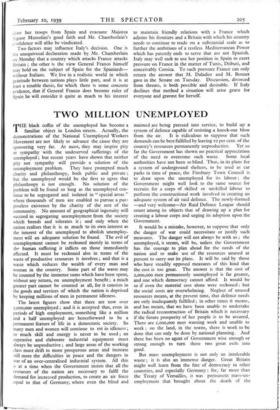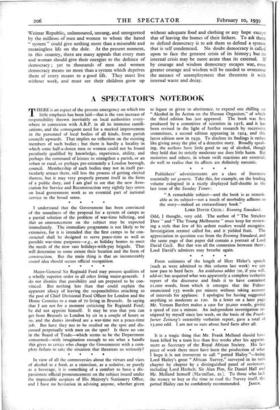TWO MILLION UNEMPLOYED
THE black coffin of the unemployed has become a familiar object in London streets. Actually, the demonstrations of the National Unemployed Workers Movement are not likely to advance the cause they are sponsoring very far. At most, they may inspire pity or sympathy with the undeserved sufferings of the unemployed ; but recent years have shown that neither pity nor sympathy will provide a solution of the unemployment problem. They have prompted much charity and philanthropy, both public and private ; but the unemployed would be the first to agree that philanthropy is not enough. No solution of the problem will be found so long as the unemployed con- tinue to be segregated and isolated in "special areas" where thousands of men are enabled to pursue a pur- poseless existence by the charity of the rest of the community. No amount of geographical ingenuity will succeed in segregating unemployment from the society which breeds and tolerates it ; and only when the nation realises that it is as much to its own interest as the interest of the unemployed to abolish unemploy- ment will an adequate solution be found. The evil of unemployment cannot be reckoned merely in terms of the human suffering it inflicts on those immediately affected. It must be reckoned also in terms of the waste of productive resources it involves ; and that is a waste which reduces the wealth of every man and woman in the country. Some part of the waste may be counted by the immense sums which have been spent, without any return, on unemployment benefit ; a much greater part cannot be counted at all, for it consists in the goods and services of which the nation is deprived by keeping millions of men in permanent idleness.
The latest figures show that there are now over 2,000,000 unemployed ; and it is accepted that, even in periods of high employment, something like a million and a half unemployed are henceforward to be a permanent feature of life in a democratic society. So many men and women will continue to rot in idleness ; so much skill and energy is never to be used ; an expensive and elaborate industrial equipment must always be unproductive ; and large areas of the working class must drift to more prosperous areas and increase still more the difficulties in peace and the dangers in war of an over-centralised industrial system. All this is at a time when the Government insists that all the resources of the nation are necessary to fulfil the demand for increased production, to create an air force equal to that of Germany, where even the blind and maimed are being pressed into service, to build up a system of defence capable of resisting a knock-out blow from the air. It is ridiculous to suppose that such demands can be best fulfilled by leaving io per cent. of the country's resources permanently unproductive. Yet so far the Government has shown no practical appreciation of the need to overcome such waste. Some local authorities have not been so blind. Thus, in its plans for a system of underground shelters, to be used as car parks in time of peace, the Finsbury Town Council is to draw upon the unemployed for its labour ; the Government might well look to the same source for recruits for a corps of skilled or unskilled labour to perform the constructional work involved in creating an adequate system of air raid defence. The newly-formed —and very welcome—Air Raid Defence League should count among its objects that of drawing up a plan for creating a labour corps and urging its adoption upon the Government.
It would be a mistake, however, to suppose that only the danger of war could necessitate or justify such measures. The danger will not always be with us ; the unemployed, it seems, will be, unless the Government has the courage to plan ahead for the needs of the nation and to make use of the resources unused at present to carry out its plans. It will be said by those who have steadily opposed measures of this kind that the cost is too great. The answer is that the cost of 2,000,000 men permanently unemployed is far greater, and one which democracy cannot afford. It would be so if even the material cost alone were reckoned ; but the social costs are overwhelming. Neglect of unused resources means, at the present time, that defence needs are only inadequately fulfilled ; in other times it means, and has meant, that we have been unable to undertake the radical reconstruction of Britain which is necessary if the future prosperity of her people is to be assured. There are 2,000,000 men wanting work and unable to work ; on the land, in the towns, there is work to be done that can only be done by national planning. And there has been no agent of Government wise enough or strong enough to turn these two great evils into good.
But mass unemployment is not only an intolerable waste ; it is also an immense danger. Great Britain might well learn from the fate of democracy in other countries, and especially Germany ; for, far more than the Treaty of Versailles, it was permanent mass-un- employment that brought about the death of the Weimar Republic, unhonoured, unsung, and unregretted by the millions of men and women to whom the hated " system " could give nothing more than a miserable and meaningless life on the dole. At the present moment, in this country, there are many appeals that every man and woman should give their energies to the defence of democracy ; yet to thousands of men and women democracy means no more than a system which deprives them of every means to a good life. They must live without work, and must see their children grow up
without adequate food and clothing or any hope except that of leaving the homes of their fathers. To ask them to defend democracy is to ask them to defend a system that is self condemned. No doubt democracy is called upon to face the greatest crisis of its history; but its internal crisis may be more acute than its external. If by courage and wisdom democracy escapes war, even greater courage and wisdom will be needed to overcome the menace of unemployment that threatens it with internal waste and decay.















































 Previous page
Previous page